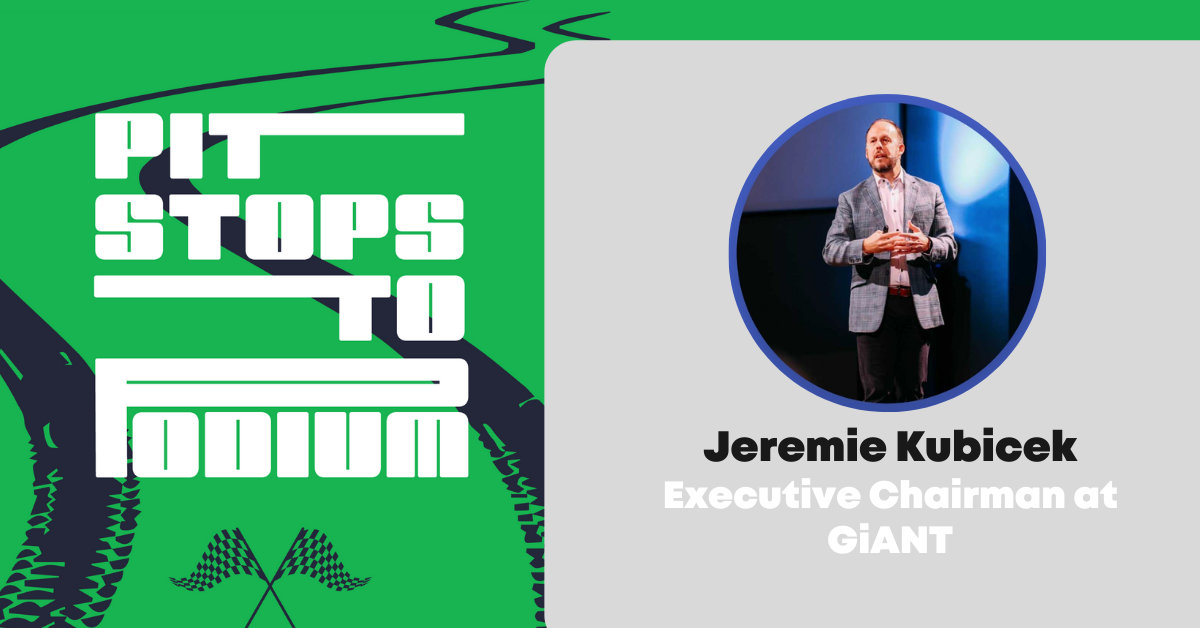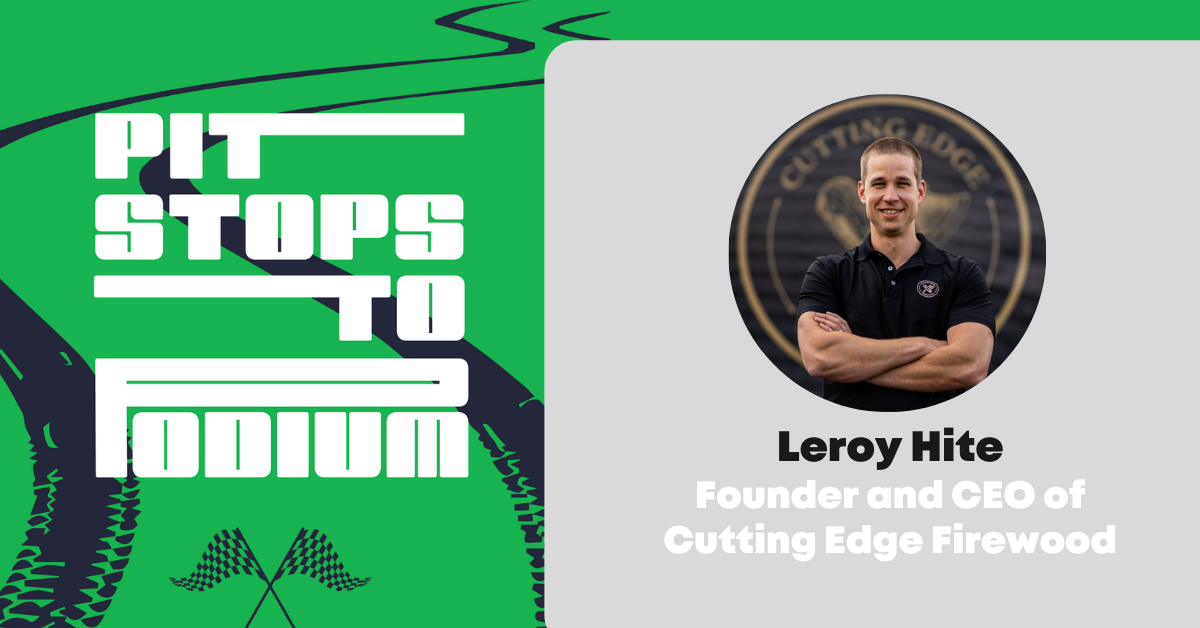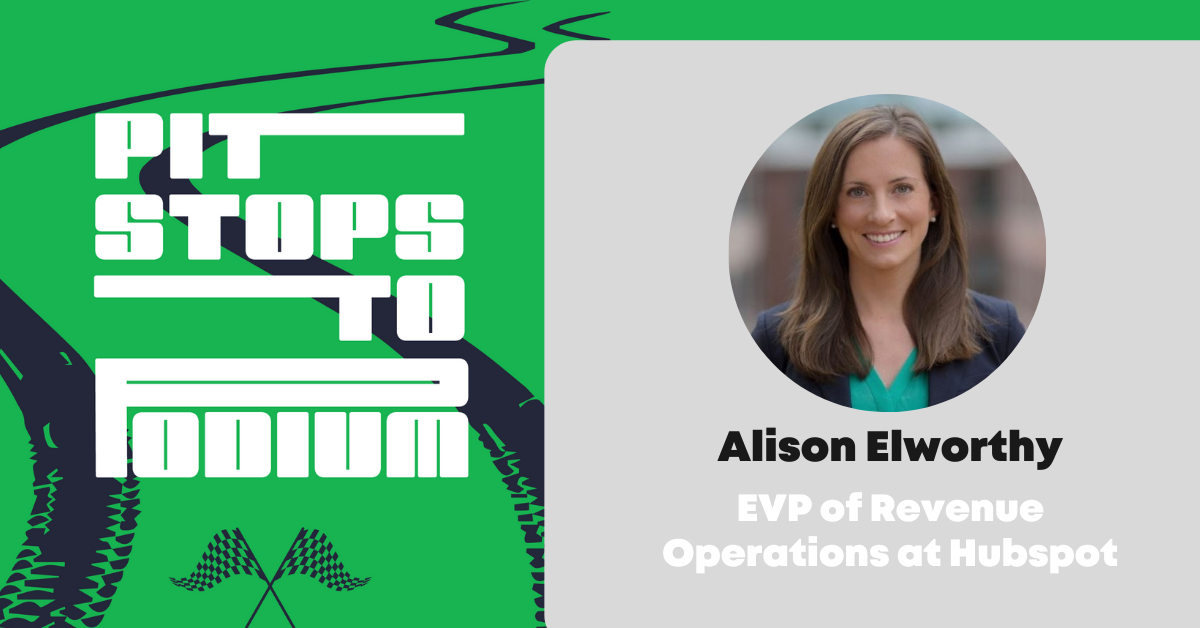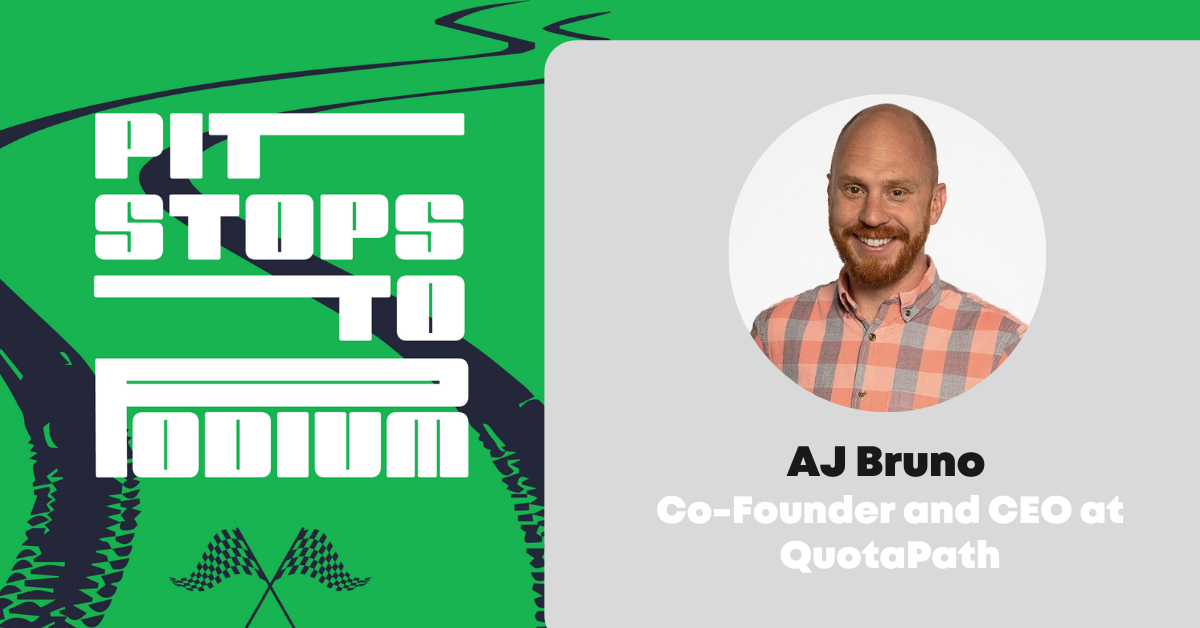Table of Contents
Learn from Jeremie Kubicek on how to discover your leadership voice and communicate with the other voices of leadership in your company on this episode of the RevPartners B2B podcast Pit Stops to Podium, Jeremie is the Co-Founder of GiANT, a company focused on certifying consultants around the globe to unlock the potential of teams. In addition to GiANT, Jeremie has started 27 companies and acquired 17 over time and his love for building extends beyond teams to neighborhoods as well! Don’t miss the free resources and assessment mentioned at the end of the episode.
Take 20 minutes to listen and digest and then head back to the races! 🏁🏆
Pitstop Highlights: Unpacking the 5 Voices
The Nurturer Voice
The Nurturer is a champion of people, harmony, and values. They are often thinking of other people, and fighting to maintain balance and harmony within the team. Nurturers often shy away from confrontation– it’s usually the last resort taken.
Because they tend to be quite sensitive and highly relational, their conflict avoidance often prevents them from standing up for themselves or voicing their ideas if others have already taken a position against it.” Surprisingly, around 43% of people possess a nurturer voice in leadership.
The Creative Voice
As an innovator, the Creative is often dreaming of long-term visions and opportunities, driving the organization towards innovative possibilities. They have a high concern for social responsibility and find themselves constantly questioning, “Are we being true to what we say? Are we truly aligned with our values and strategy for the sake of our or clients and employees?”
Often, Creatives can be difficult to understand as their communication doesn’t align with what they actually deliver. Nevertheless, they provide a significant competitive advantage to most teams due to their ability to see long-range opportunities.
The Guardian Voice
With 30% of the population possessing a Guardian voice, you’ll never have trouble finding at least one on your team. They tend to speak their mind, ask difficult questions, and thrive on the complete decision-making process.
A challenge for the Guardian voice lies in managing their tone and tact towards team members, especially in situations with strongly held opinions.
The Connector Voice
The Connector is the champion of relational networks, collaboration, and effective communication. You may often see this with a charismatic leader who thrives on their love of communicating visions and goals to everyone they meet.
The Pioneer Voice
With only 7% of the population possessing a Pioneer voice, Pioneers are less commonly seen among teams. But when they are, their voice and actions will be noticed. Pioneers love to compete and play the role of captain, relishing the challenge to move everyone forward. They always want to be the one to make the tough decisions or take the last-minute shot to save the day.
Connect with Jeremie:
- Connect on Linkedin: https://www.linkedin.com/in/jeremiekubicek/
- Follow on Twitter: https://twitter.com/jeremiekubicek
- Website: http://jeremiekubicek.comKB
Full Transcript
Brendan: Hey, everybody, welcome to Pit stops to Podium, the RevPartners podcast, where we talk to executives who have competed and won in taking their companies from high growth to high scale. My name is Brennan Tolleson. I am the co-founder and CEO of RevPartners, and I'm delighted to have Jeremie Kubicek for this episode of Pit Stops to Podium. Welcome, Jeremie.
Jeremie: Good to be with you. Thank you so much. You have a great reputation and some of my friends speak highly of you, so I'm really excited to be able to hang out. I wish we got to hang out more often.
Brendan: I appreciate the kind words. The feeling is mutual. And Jeremie, just so our audience knows who you are. You serve as a co-founder of Giant, and I'd love for you to help our audience know who Giant is and ultimately what you do.
Jeremie: Yeah, so our business is basically we certify coaches and consultants around the world to use our content and our technology to serve companies, teams, organizations, and we basically know how to unlock the potential of people. But we do it through coaches and consultants, so we're almost like a wholesaler to them. But we also have a program called catalyst, and it's internal champions people who want to take this inside the company. They can actually use the technology in the content as well. It's 21st century content, and so it's sticky. It's scales and it works.
Brendan: And I love your content. I think it's going to be really great for our audience as we talk about companies that are looking to transition at high growth, high scale type mode. And so it's so much the content you create is so relevant and so practical to our audience. But before we get into some of that content. Jeremie, we do have a tradition here and it's to get to know our guests outside of work. So what are three fun facts that our audience should know about you?
Jeremie: Let's see. I play harmonica and the guitar, and I work on music projects on the side. It's kind of a hobby. I've lived in Russia. I've lived in London. Fact number two, I've lived and/or traveled all over the world and a consistent basis. I love to travel and the three. My wife and I built the neighborhood because when we were in London, we decided if we moved back to America, I don't want to live in just the suburbs. So we built our own 50 acre, 25 house, 22 house neighborhood. And it's been really fun. So yeah, those are some fun facts.
Brendan: It might be the most unique fact, I've ever heard that you created. That's awesome. And what's the favorite place that you've traveled to?
Jeremie: The Maldives were amazing. Actually, Turkey is one of the most unique and fun places that we've been. So a blue cruise, the Turkish Isles, which is like the Greek Isles, but cheaper. And more of an adventure. They're really, really amazing.
Brendan: I have a 10 year anniversary coming up, so I might have to check that out in my research.
Jeremie: It's legit.
Brendan: Well, Jeremie, I appreciate you sharing some of the fun facts about who you are. Let's transition to our big idea. We talked a little bit earlier about how giant produces great content for leaders, and I think this is a great opportunity for us to park on one of those assets. The giant is created, and that's really around the five voices of leadership. And so before we kind of dive in that big idea, I'd love for you to kind of tease out or at least help our audience understand what the five voices of leadership are.
Jeremie: Yeah, so the five voices, we basically we were so frustrated Steve Cochran and I, who's my British business partner. He and I were living in London, and we were frustrated because we had seen disk myers-briggs and even Instagram really good things that were really helpful, but they didn't scale very well. And so scaling was always an issue. So we called it a cul-de-sac learning. It's like Harvard. It's really smart for the people at the very top. But not everyone gets to play and we're like, no, no, no, what would it look like if everyone could get to play? So what we did is we created a formula around Union typology where myers-briggs came from. And it's really the five voices. And so the five voices would be really understanding that every one of us has a natural bent and natural personality that we communicate from a foundational personality. But we can play in all of them because we're adaptive as humans. And we've all been around them. So the voices would be a nurturer, creative guardian connector and a pioneer. And we did it this way because it's much more memorable and sticky to say I'm a connector creative than saying I'm an efp, or it's better to say I'm a creative than a 7 with a winning eight, or I'm a pioneer, but I'm a high D high and that no one knows what that means, but people can understand creative connector, nurturer, guardian pioneer. And so that was the premise behind it together. We want everyone to be able to play. And since then, it's just taken off. And so Google uses it globally. The US Air Force trains all the captains and majors. We're working with Chiefs of staff in Congress. It's starting to spread like wildfire because everyone can play.
Brendan: I like that it's, you know, we use the word democratizing a lot in our space. But I think it's the same concept of how do you create common language that everyone can consume and understand, as opposed to acronyms or numbers that other frameworks use? Before we dive in more into the different voices that you just articulated, let's park first on why is this important? And especially let's think in the context of who our audience is. And so you have sales and marketing leaders at high growth companies. Why is it important that they understand what their voice is?
Jeremie: So here's what I've known over all the years of building companies, and you know, I've started 28 companies. I've acquired 17 companies over time, so I've just done a lot in business and that's what I do for a living, right? So I create content around that helps unlock people. Here's the reality. Most people are always wanting their team. Hey, let's just get on the same page, right? Come on, let's go get on the same page. All right, now, let's make it happen. Mm-hmm So same page make it happen that forced to do that, that pressure to get there. What happens is people go, yeah, but I don't really like you. Or you're telling me to do something you're not willing to do for yourself or so it's called communication and relationship. It's relational trust. So before you can get any traction, I know a lot of people use attraction or something before you can do any of that. You have to build trust and trust is where it's all built on. And if you don't have trust, then you're going to get compliance. But to get engagement, that means that you actually help people turn their pilot light on, you help them want to work for you, not have to work for you. So what we've done is we've basically created tools and systems and content that helps build unbelievable relational trust with your people and helps them learn how to communicate with them, know your people to lead your people. And then by doing that, it's so much easier to get aligned. And it's so much easier to execute. Most people know what generally to do, but they don't want to do it with you because they don't like you. And that's just a fact. And so what we do is we basically try to eliminate that and build that core trust.
Brendan: I like that like how you describe this juxtaposition between compliance versus engagement in order to facilitate that. It's one to understanding and which generates the trust, which enables you to have those type of interactions and conversations. So let's transition now. We talked about why it's important you do it a little bit in terms of those five voices are, but let's unpack each one of those 5 for our audience.
Jeremie: Yeah so if you're seeing it on the screen here and those of you who are not know like, hey, I'm just listening to it, I'll speak to it. But I basically put it up on the screen because you have the five voices, you have the nurture, the nurture and the Guardian make up 73% of the population. And this is another crucial reason why you need to learn this, because if you're a leader, you're the tendency is to be future oriented and most leaders that get put in this positions are hired. The higher up you go, the more future oriented voice that you have, which the future oriented voices are, the connectors, the creatives and the pioneers. The problem is that those voices only make up 27% of the population. So you're missing 73% of the marketplace. So if you think about the voices themselves to understand which one are present oriented versus future, that alone reduces drama because most drama is affected by that. The future oriented leaders are so fixated on like, hey, let's go over here, don't you see it? And the nurtures are like, yeah, remember last year when you pitched your big idea, do you remember Barbara, like Barbara, died? Remember that she's not with us anymore? And then the guardians, because it nurtures, are fixated on people. They want to make sure people are good. Well, that's 43% of the population, 30% of the population are guardians, and they're like foot on the brake. They're working on logistics and systems and IT and infrastructure and grid systems and blah blah, blah blah. So yeah, you remember last year we lost a million and it didn't work. Remember that. So you have to build the bridge to if you're a leader. This is important is you have to know the people that you're leaving. Does John drive you nuts? Well, he's a guardian and you're a connector. There you go. That's a big. And if you understand that you'll begin to empathize, you'll begin to understand them and you'll start speaking their language. And then all we're trying to do is get their foot off of the brake, not necessarily to put on the gas just off the brake. So that's just some of the examples of why it's important to know personality and wiring and have everyone in your organization understand it like everyone. Because if everyone gets it. And understands it, then you can speak that common objective language. I like this a lot. This is I love frameworks and I like how you position this is there. As I look through this in terms of present versus future now, does it matter kind of what the distribution is in terms of who sits in what seat or is your point? More of it just important to know what personality each person has? Yeah, it's really important to understand who has what personality. Now it does. So if you are the CEO again, the tendencies are you're going to be more you're the driver of vision, you're setting the tone and the direction. So if you understand, for instance, that you are a creative, that means that you're only reaching by your voice. Only about 10% of the population, maybe 15% of the base you're reaching your innovators and early adopters of the organization. So if you know and understand that, you can communicate more effectively. So if you know, hey, I'm a CEO and I'm a future oriented CEO, then it makes sense for you to build. We always say like advisory group, the who's the guardian, that if they speak, everyone listens and who's the nurturer same way? Well, if you're presenting a big rollout of some new product or what have you at town Hall meeting or whatever will bring the guardian and nurture up on stage with you, so they speak. Because when they speak, they're going to reach the majority. They're going to reach their early majority, they're going to reach late majority and all the laggards are going to listen to them. So that's just an example of doing something, just being smart with communication.
Brendan: I like that I think it's a good transition into the last topic that I want to look at, so we discussed why it's important. We looked at what are the five personalities and where I want to go next is what you were just describing there. But if we think about different kind of seasons of growth, when would you recommend a company to embrace this type of investments? The wrong word, but this understanding of the personality of their team? Are there different phases that you look at or ways in which you say, hey, this is the time that you need to be embracing this because it's going to impact your ability to grow because you don't have the trust in your organization?
Jeremie: Yeah so the interesting it's a great question. And what we have to have another tool. We have a tool for all, all of these. We have about 70 different tools. And what we figured out is that you have to use visuals into 21st century learning, micro learning for 21st century adults who are cynical notables. So you have to create them in an easy tools so they can teach it to other people. So here's the answer to your question. It's called pass. The baton startup phase is typically where the future oriented voices live. They thrive. Hey, we've got this new product. Do you see it? What if we were to do xy z? Well, they're the connectors, the creatives and the pioneers, because they're establishing something that doesn't exist, so that's a startup. When you get to the establishment phase, that means that we're actually needing to build infrastructure or building systems, we're building people or building in our playbook, our HR guy, you know, all of those kind of details. That's when the nurturers and the guardians really, really thrive. And then once you're settled and then you start expanding, that's when the future oriented voices come back in. It doesn't mean that the guardians nurtures don't play and start up, and it doesn't mean that the other future voices don't play during establishment. It just means that if you don't Institute those systems at a key component, then the company is going to go up and it's going to come right down because it never established their systems.
Branden: Well, thank you for sharing that. Well, Jeremie, this has been fantastic for me. I know selfishly as we're building understand what voices. We should be mindful of these different stages of growth and why it's important that we invest in this type of a framework. What would be a practical next step that our audience could take to learn more about some of the content you shared today?
Jeremie: Yeah so we have a platform and I know you're going to share it in your notes. So Giants TV, but you'll have there will be a specific link here that you can see and go to if you want to take the five voices assessment and find out who you are. It's free. You can do that. So you just follow the link, it'll take you there and then it gives you videos and all types of practical examples to help understand yourself. And if you want to go deeper, then you can play and go deeper. It'll be a natural place for that
Branden: Great, well, audience if you didn't hear that there will be a complimentary assessment that you can take as it relates to your personality, which is fantastic, and we'll get you more details there. Jeremie, if our audience was engaged with you, what were the best platforms for them to reach out?
Jeremie: Yeah, I mean, you can reach out if you want to get direct to my speaking side is Jeremie Kubicek. Now that's not the easiest name, so it's Jeremie Kuby. I seek and there's information on books. Me, you can connect there as well. So that's what I would lead you to.
Branden: Well, Jeremie, Thanks again for stopping by for this episode of pit stops and podium. We love learning more about the five voices of leadership and wish you all the best is move forward.
Jeremie: Thanks, sir. Appreciate it. Cheers you.
Want to learn from more industry experts?
Come check out the full Pit Stops to Podium podcast repository!




